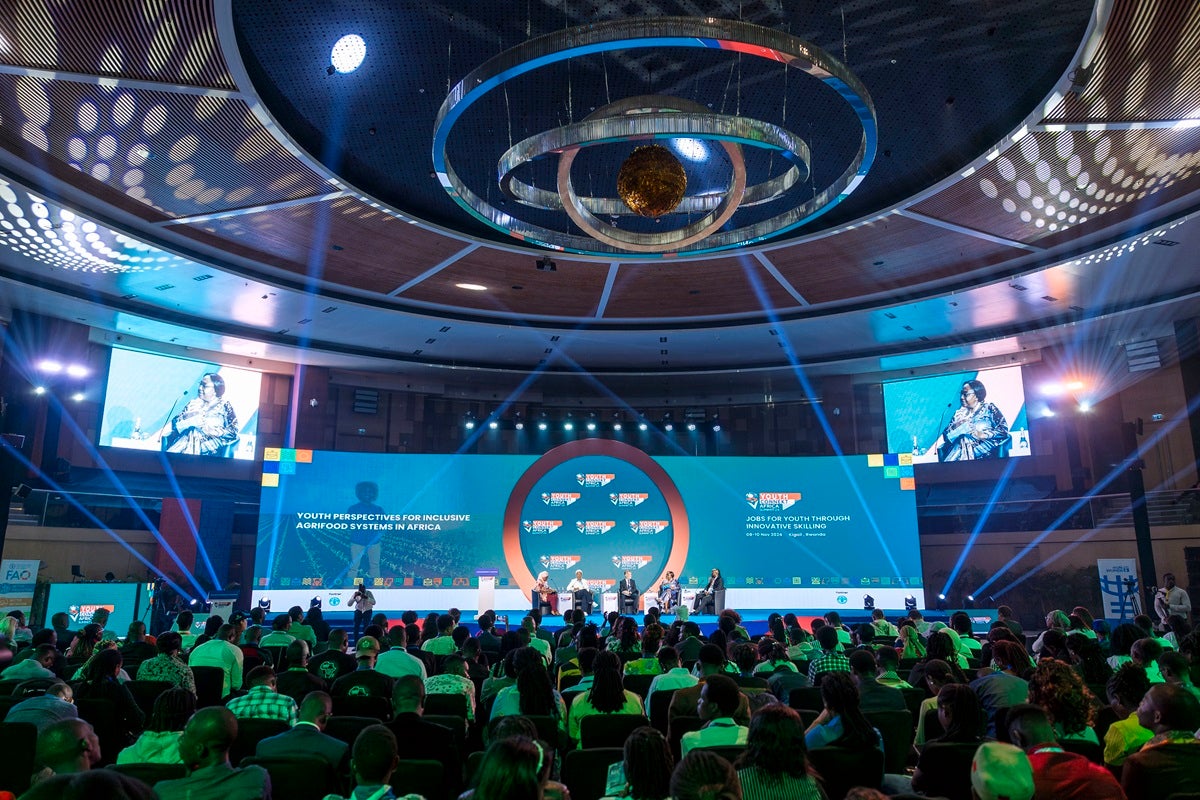Paving the Way for Gender Equality and Youth Empowerment in Africa: UN Women at Youth Connekt Africa Summit 2024
Date:
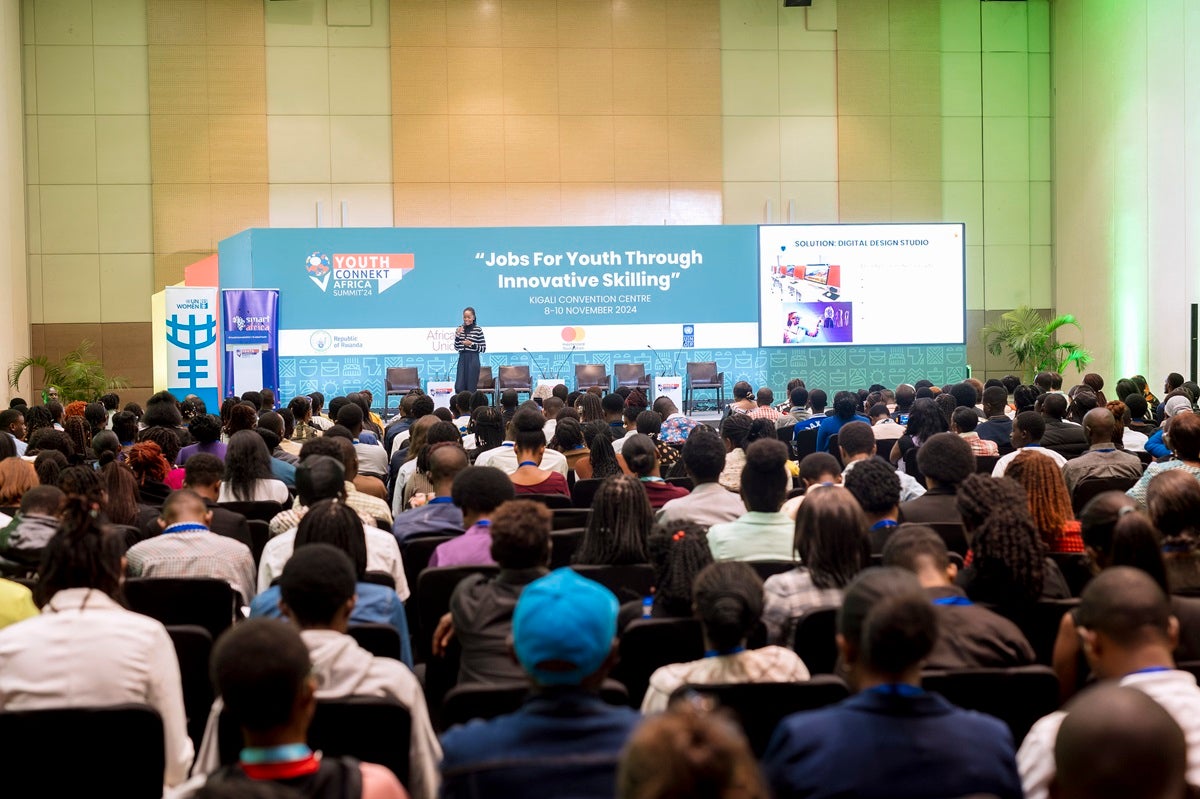
Bringing together over 3,000 young people from across Africa, the 7th edition of the Youth Connekt Africa Summit, held in Kigali from November 8-11, 2024, marked a significant milestone in advancing gender equality, youth empowerment, and innovation among key youth and other stakeholders on the continent. 20+ African ministers of youth, youth entrepreneurs, leaders, innovators, artists, and students converged in Kigali for the summit.
Themed "Jobs for Youth Through Innovative Skilling," the summit was opened by the President of Rwanda, H.E. Paul Kagame, who emphasized the tangible benefits of unlocking the potential of Africa’s youth. President Kagame underscored that “It's no longer just the potential people have been talking about, the potential of our continent; no, we have seen how that potential has materialized to actually prove that everything is possible.” UN Women has forged partnerships with the Government of Rwanda through the Ministry of Youth and other partners, demonstrating its steadfast commitment to uplifting young women, especially in underrepresented sectors like technology and agribusiness. For years, UN Women has supported the summit to amplify the voices of young women, nurture their talents, and equip them with resources and partnerships essential for sustainable change.
Empowering the Next Generation of Women Innovators: Tech, Innovation, and Startup Pathways for Young Women in Africa
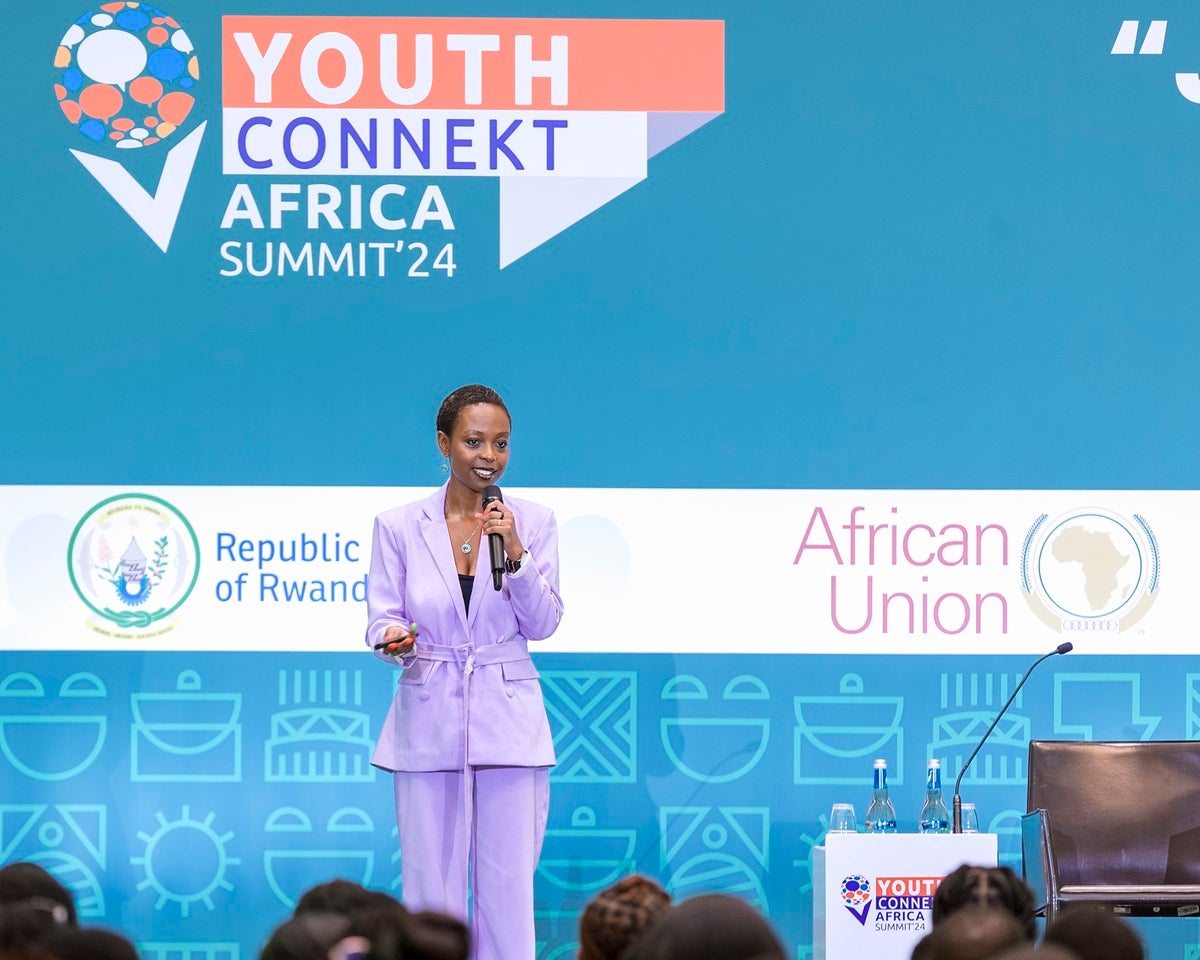
A parallel session on “Empowering the Next Generation of Women Innovators,” co-organized with Smart Africa, focused on the critical role young women play in Africa’s digital economy and identified challenges such as limited access to finance, the need for policy reforms, and the lack of supportive infrastructure. . The session aimed to establish sustainable pathways for women-led innovations, empowering them to contribute meaningfully to Africa’s socio-economic growth. Speakers, including founders of women-led startups, angel investors, venture capitalists, mentors, and policymakers, shared insights on actionable solutions that enable women tech leaders to succeed.
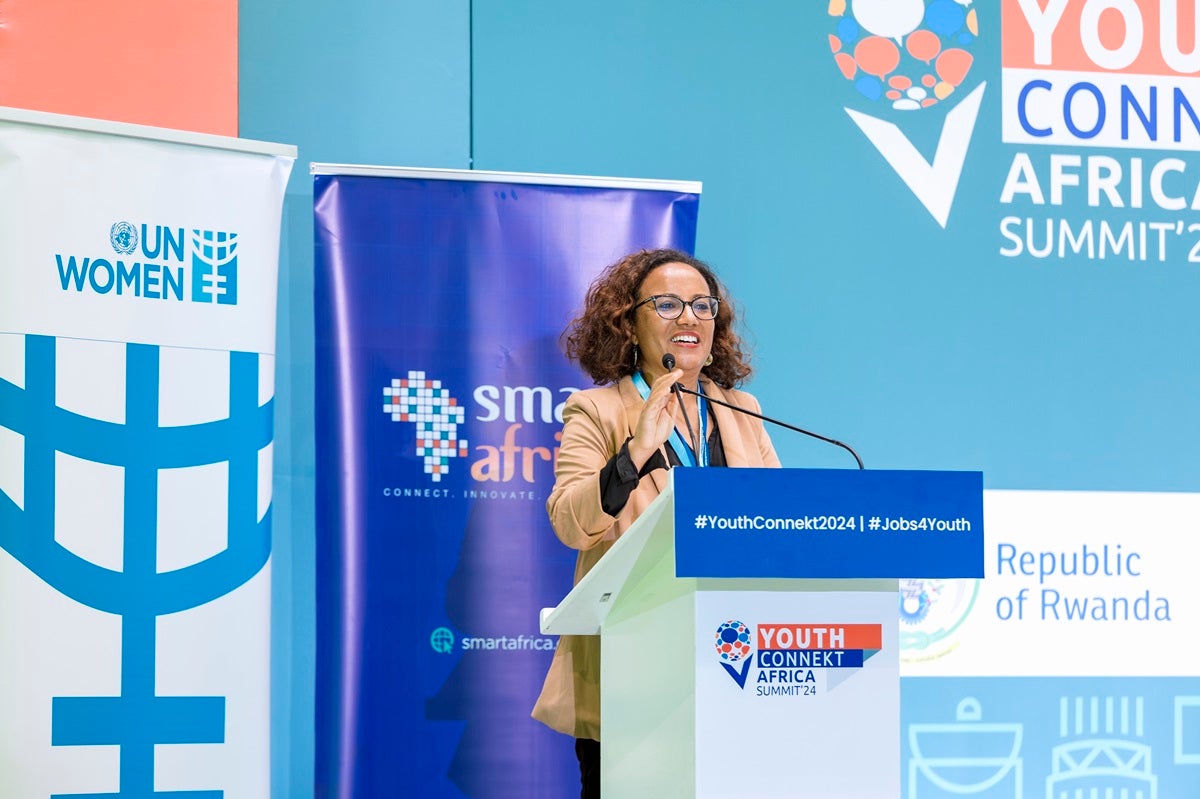
Delivering opening remarks on behalf of the UN Women Rwanda Country Representative, Ms. Tikikel Alemu, Programme Management Specialist, stressed the urgency of bridging the gender digital divide and empowering young women to lead in tech and innovation, stating, ”At UN Women, we recognize that empowering young women in tech and innovation is not just a matter of providing equal opportunities, it’s about creating an enabling ecosystem where their talent can thrive, where their ideas can flourish, and where their leadership can shape Africa’s future.”
Ms. Rym Jarou, the Unit Manager of Technology Driven Entrepreneurship at Smart Africa, emphasized the importance of empowering youth, especially young women, who are often underrepresented in the tech sector.
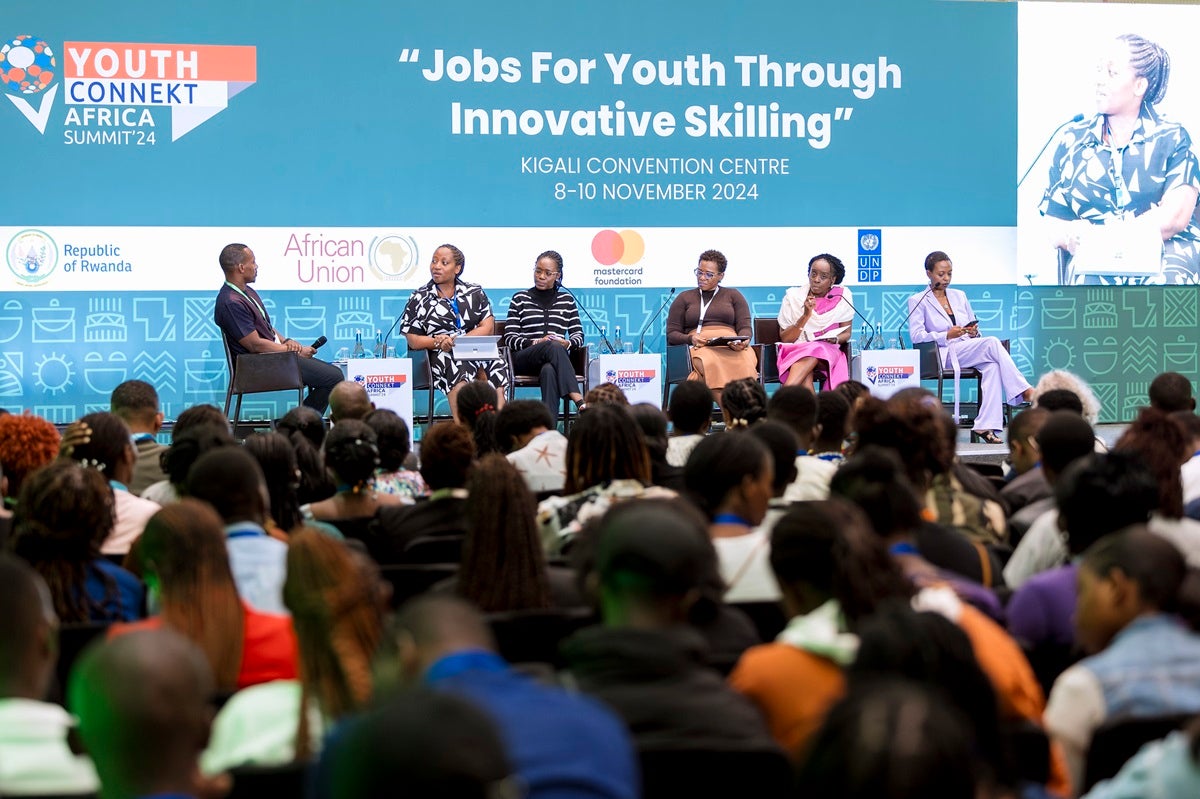
Keynote speakers at the session included two young women innovators, Joyce Berabose, CEO of LUNA, and Grace Ussenge, Co-CEO of Kuza Africa, who shared their inspiring journeys as tech entrepreneurs. They highlighted the unique challenges women face in the sector, including limited access to resources, mentorship, and policies. Joyce is a pioneering FemTech entrepreneur based in Kigali, Rwanda, and the Co-founder and CEO of LUNA, a digital platform transforming women's health and wellness across Africa. Through LUNA, she provides accessible, high-quality healthcare solutions focused on menstrual and reproductive health, empowering women from adolescence to menopause to manage their well-being. Grace is an award-winning entrepreneur and self-taught web designer, serving as Co-CEO of Kuza Africa, a Kigali-based hub that empowers fashion entrepreneurs through technology and sustainable practices. As a champion of sustainable entrepreneurship, she pioneered Rwanda's first Slow Fashion Week, inspiring a new generation to build impactful and resilient businesses.
An all-experts panel at the session discussed the “Missing link for young women entrepreneurs”, highlighting how young women can overcome the barriers they face in tech entrepreneurship such as access to finance, policy reforms, and infrastructure, and offering actionable solutions to support women tech leaders across the continent. The experts in the room included founders of women-led startups and social enterprises from across Africa, impact investors focusing on the African tech and innovation sector, mentors and experts, as well as development partners and policymakers. Featured on the panel were Prudence Ngwenya, Director - Women, Gender and Youth Directorate at the African Union (WGYD); Alice Nkulikiyinka, Country Director of Business Professionals Networks (BPN); Josephine Nyiranzeyimana, Government Chief Information Officer, as well as Grace Ussenge and Joyce Berabose.
This session underscored the importance of inclusive support systems to allow young women to thrive in technology and entrepreneurship, as well as policy frameworks that not only encourage education, but also create sustainable pathways for young women to become successful. From an investment perspective, it was also highlighted that business networks are essential for empowering women, emphasizing the importance and benefits of collaboration to scale programs that are already achieving impactful results.
Youth Perspectives for Inclusive Agrifood Systems in Africa
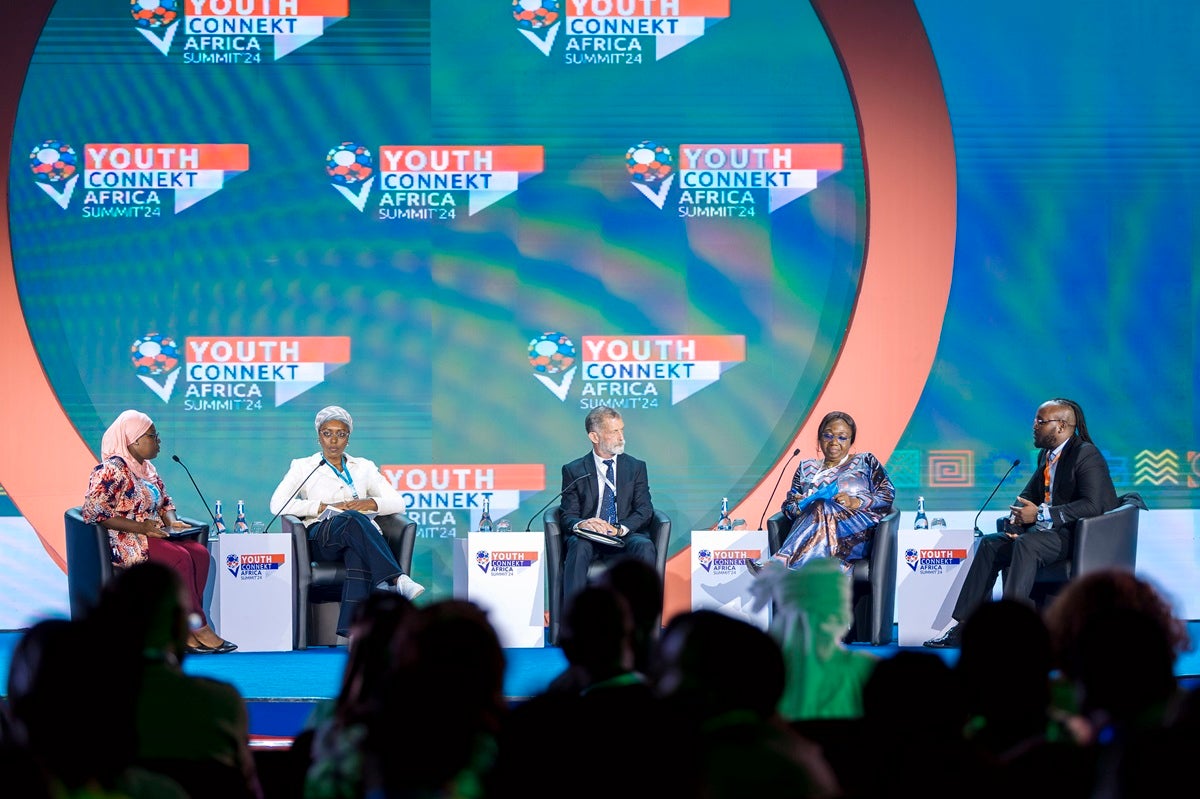
UN Women and the Food and Agriculture Organization of the United Nations (FAO) partnered to organize a plenary session entitled “Youth Perspectives for Inclusive Agrifood Systems in Africa,” which convened around 2000 young Africans, government officials, entrepreneurs, development partners, and other stakeholders. This session sought to apply a gender lens to address the barriers young women face across agriculture value chains including the requisite digital tools and policies to make agribusiness a viable career path for youth. The plenary session showcased how innovation can drive sustainability and inclusivity in Africa's agrifood systems. The engaging discussions emphasized the need to shift perceptions around agriculture, portraying it is as a dynamic sector for youth, and addressing cultural and societal barriers that inhibit their meaningful participation across value chains. The need for mentorship initiatives for young people was expressed as a key area for increased intervention, especially for young women, to support their navigation as new actors within the sector.
Ms. Jennet Kem, the UN Women Country Representative for Rwanda, discussed efforts to ensure rural women have access to credit, training, and technical support through collaborative programs. Dr. Ron Rosati, Vice Chancellor of the Rwanda Institute for Conservation Agriculture (RICA), emphasized the need to equip youth particularly young women with skills relevant to the agricultural sector. He advocated for agriculture as a profitable and viable career path, challenging the perception of the sector merely as a rural or low-status occupation.
Closing the panel, Madam Kem encouraged young people to believe in themselves, highlighting confidence as the foundation for personal growth. She emphasized the importance of building self-esteem, self-awareness, self-image, self-education, and, most importantly, self-love qualities which are essential for bold decisions, such as pursuing careers in agriculture.
Showcasing Young Girl`s Innovation Potential through the African Girls Can Code Initiative (AGCCI)
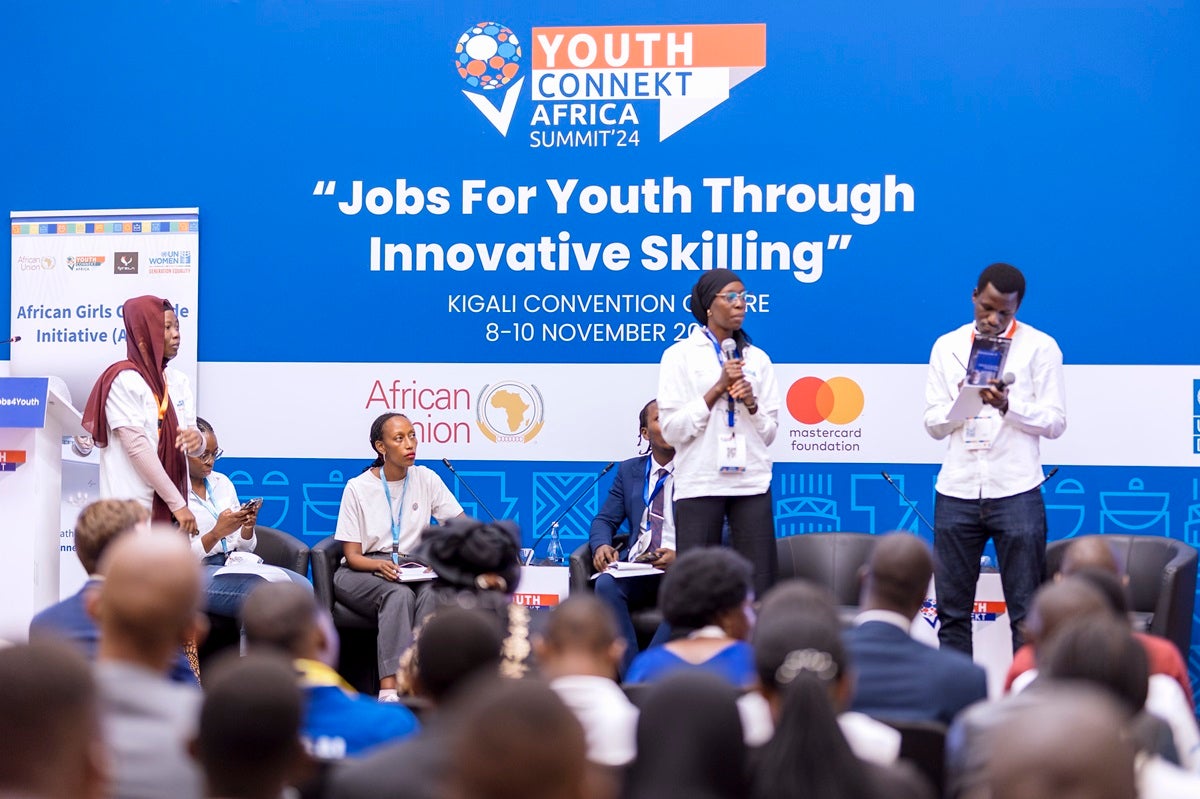
In partnership with the African Union Women, Gender, and Youth Directorate, UN Women hosted a Mini-Hackathon under the African Girls Can Code Initiative (AGCCI). This initiative empowers young women with essential tech skills and confidence, fostering a new generation of African women leaders in technology. The event brought together young girls from Mali, Senegal, Mozambique, and Rwanda, to showcase innovative projects to bridge digital literacy and skill gaps. Projects presented included mentorship applications and digital learning platforms, with panelists highlighting the importance of business sustainability and intellectual property protection.
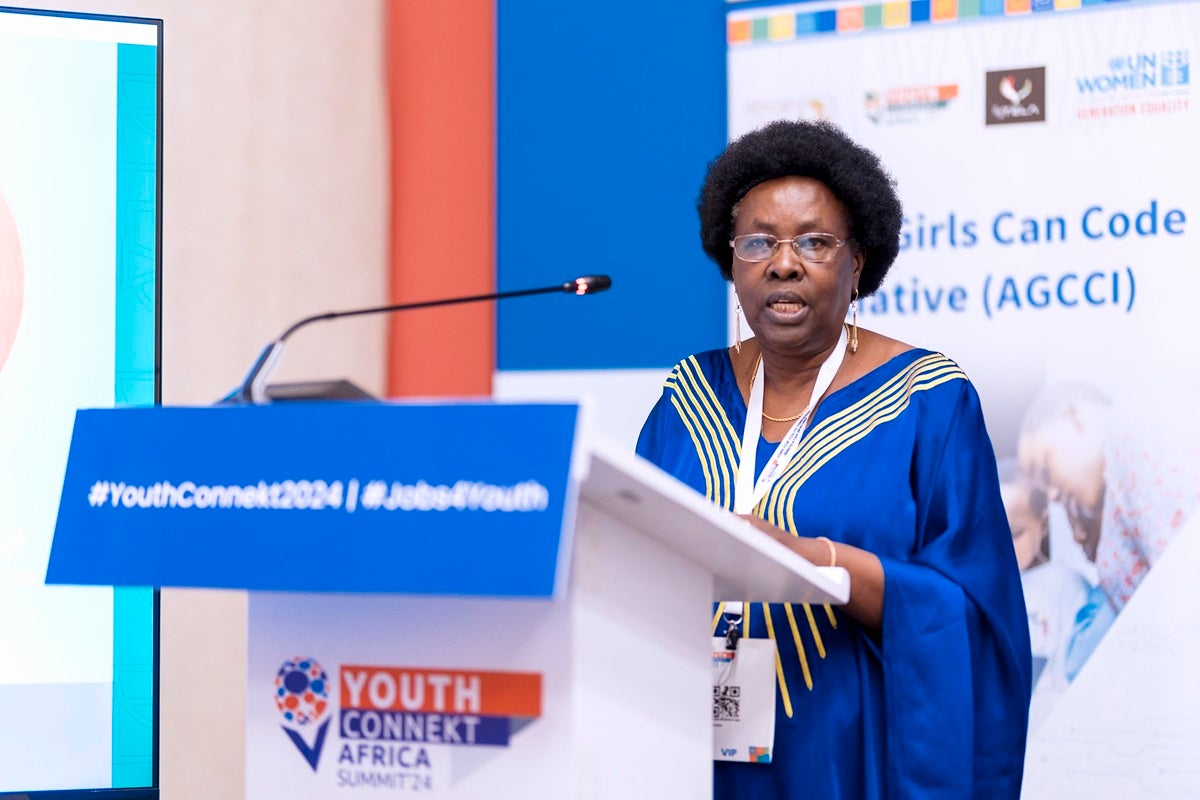
Ms. Cecile Mukarubuga, the UN Women Special Representative to the African Union Commission and ECA, acknowledged the AGCCI hackathon participants from the four African countries, providing the history of the initiative, its impact to date, and vision for the future. She concluded by expressing UN Women’s gratitude to the Government of Belgium for their generous support in empowering young women and girls in STEM through the African Girls Can Code Initiative, a catalytic regional program coordinated by UN Women.
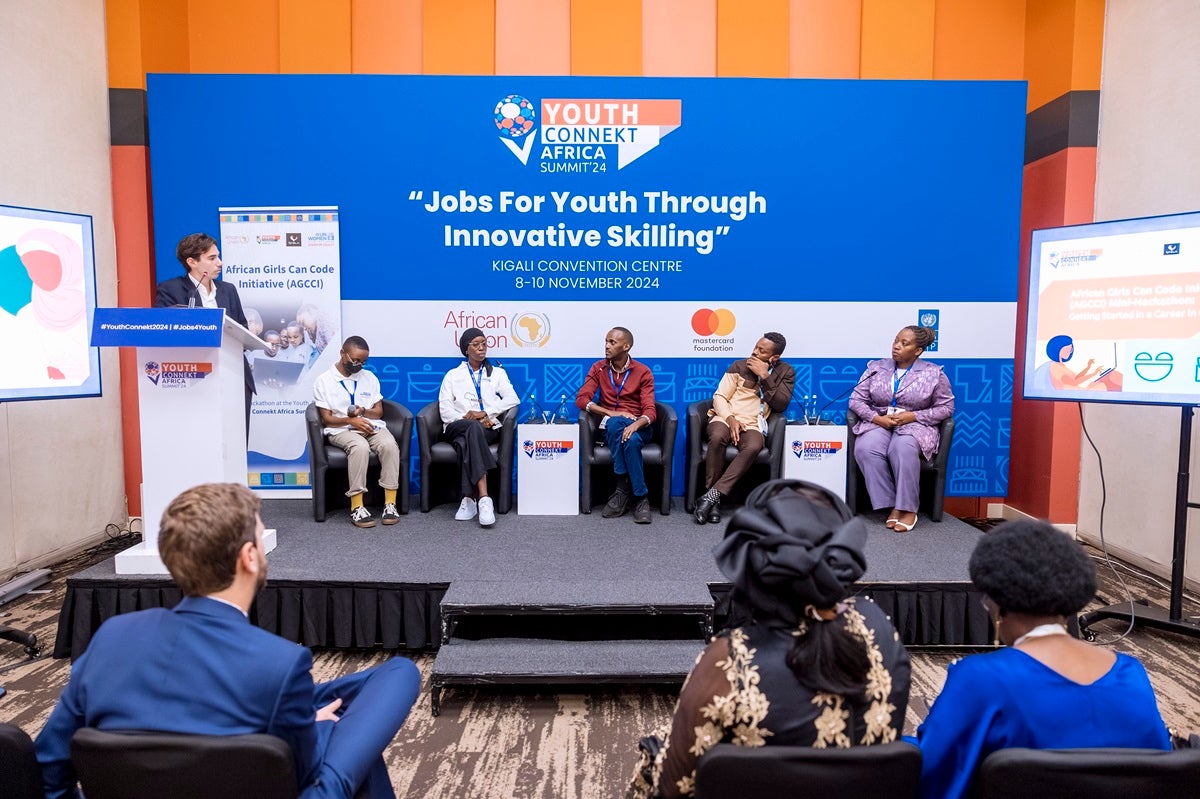
The panel session “Getting Started in a Career in Coding” highlighted pathways for young women in tech. Two AGCCI alumni shared how the program ignited their passion for technology.
Ms. Josephine Nyiranzeyimana, CIO of Rwanda’s Ministry of ICT, emphasized the importance of universal access to digital skills, and mentioned Rwanda's plan to establish more innovation hubs beyond Kigali. Mr. Joshua Kweikuma Quaye, the Youth Engagement Lead at the African Union Commission, spoke about the AU's digital transformation initiatives and partnerships with Meta and TikTok, while acknowledging internet access challenges in some areas. Mr. Alex Ntare, CEO of the Chamber of ICT, underscored the need to engage young women early, emphasizing that foundational tech skills and confidence are vital for applying these skills in real-world settings.
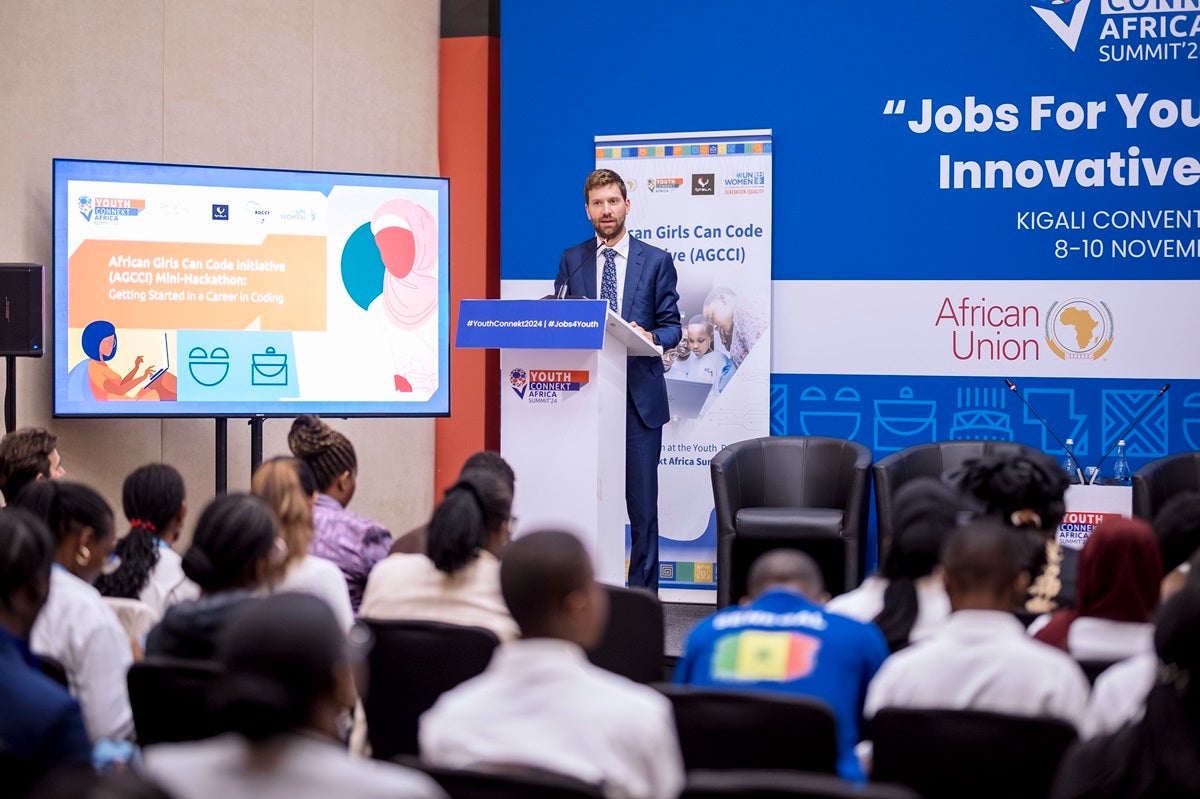
To conclude the hackathon, Mr. Laurent Preud’homme, Deputy Head of Mission and Head of Cooperation at the Belgian Embassy in Rwanda, delivered the final remarks, highlighting Belgium's steadfast support to the African Girls Can Code Initiative and appreciated the partnership with UN Women to empower young women in tech. He commended the participants for their dedication to developing solution-oriented innovations to address real challenges on the continent, and encouraged them to pursue career growth in the tech field. The event ended with the awarding of the hackathon winners by Mr Preud’homme.
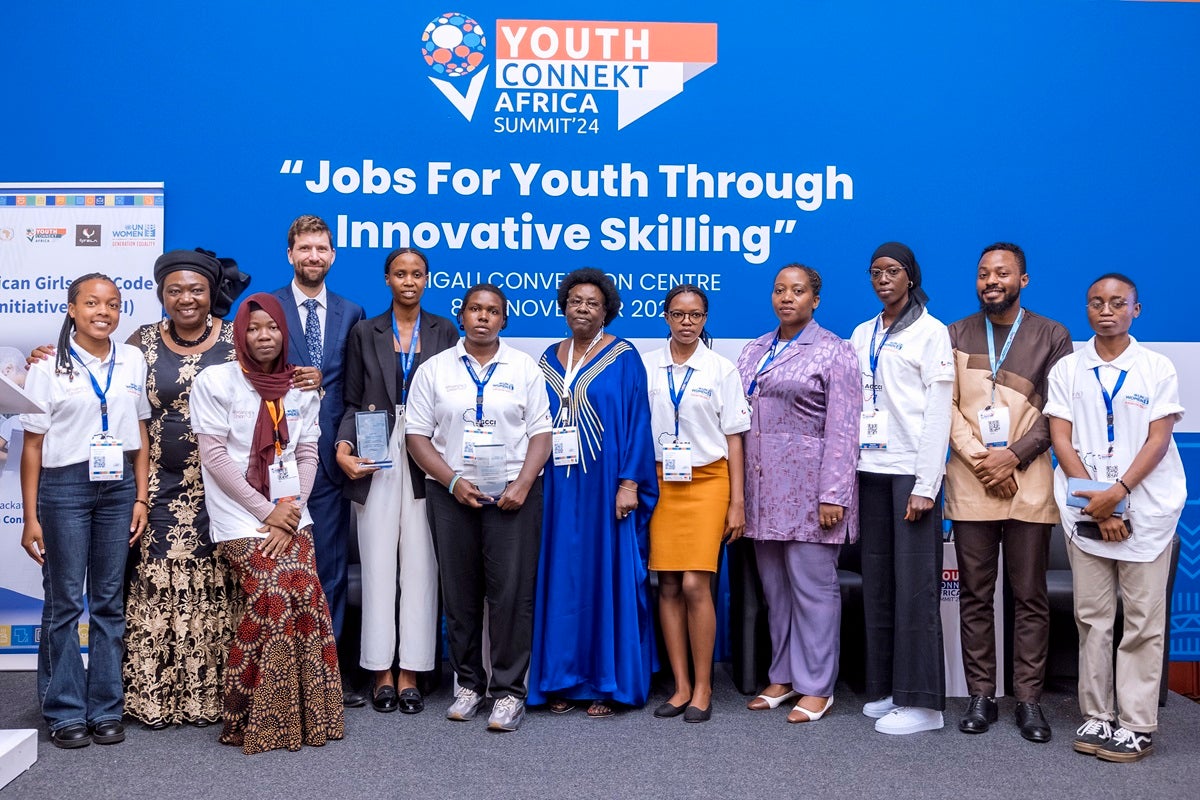
Youth Connekt’s Legacy and UN Women's Continued Support
Since its inception in 2012 in Rwanda, Youth Connekt has created over 8,309 jobs for youth, awarded 260+ project pitch winners, and trained over 772 youth in skill development. Now spanning 33 African countries, the program also includes the Youth Connekt Awards, which recognize outstanding youth achievements. UN Women's involvement in Youth Connekt aligns with the UN Youth Strategy 2030, which emphasizes that young people should be empowered as leaders and not only engaged, but leading global efforts.
Through initiatives like the African Girls Can Code Initiative, support to inclusive agrifood systems, and partnerships with tech stakeholders, UN Women reaffirms its dedication to a future where young African women are equipped, empowered, and positioned to lead change across the continent.
